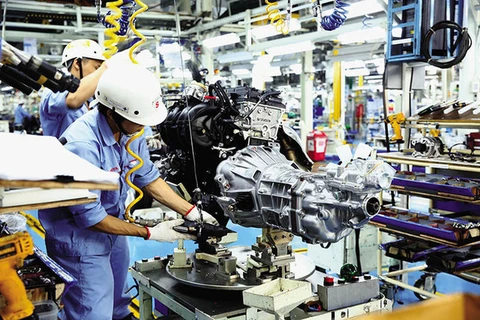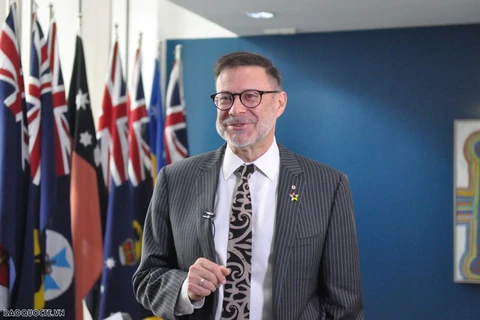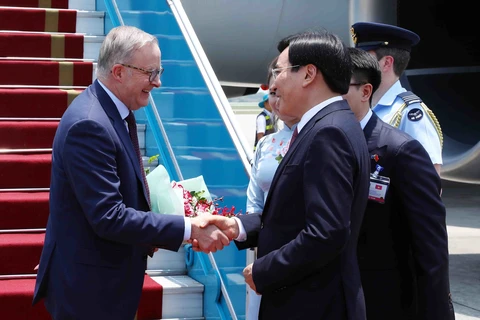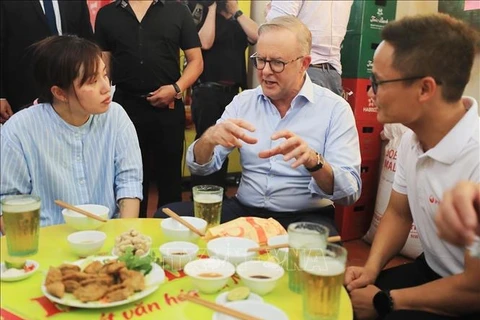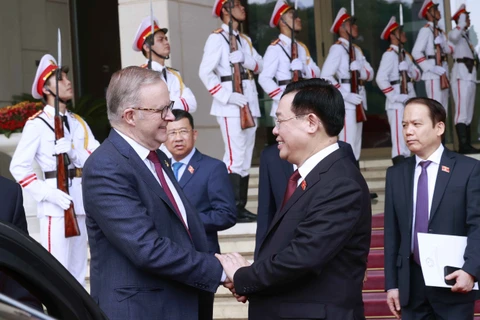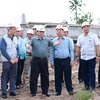 Prime Minister Pham Minh Chinh and Australian Prime Minister Anthony Albanese at their talks.(Photo: VNA)
Prime Minister Pham Minh Chinh and Australian Prime Minister Anthony Albanese at their talks.(Photo: VNA) Hanoi (VNA) – Australian Prime Minister Anthony Albanese and his entourage left Hanoi on June 4 evening, concluding a two-day official visit to Vietnam at the invitation of his Vietnamese counterpart Pham Minh Chinh.
Within the framework of the visit, PM Albanese and the Australian delegation had a wide range of activities such as laying wreaths in tribute to late President Ho Chi Minh at his mausoleum in Hanoi, holding talks with PM Chinh and meeting with the press, and meeting with General Secretary of the Communist Party of Vietnam Nguyen Phu Trong, President Vo Van Thuong and National Assembly Chairman Vuong Dinh Hue.
On this occasion, the two PMs visited the women’s football teams of Australia and Vietnam. PM Albanese visited RMIT University and enjoyed Vietnamese sandwich "banh mi" and drank "bia hoi", a locally brewed beer often used by Hanoians on hot summer days.
 Australian Prime Minister Anthony Albanese joins with Prime Minister Pham Minh Chinh in an exchange event with the women’s football teams of Australia and Vietnam in Hanoi on June 4. (Photo: VNA)
Australian Prime Minister Anthony Albanese joins with Prime Minister Pham Minh Chinh in an exchange event with the women’s football teams of Australia and Vietnam in Hanoi on June 4. (Photo: VNA) The high-level meetings within the framework of the visit took place in the spirit of openness, frankness, sincerity, and trust. The Vietnamese and Australian leaders were pleased to see that the two countries' relations are developing fruitfully and effectively. Political trust, mutual understanding, and respect have been further consolidated through regular delegation exchanges and high-level meetings between leaders and people of the two countries.
Economic-trade cooperation has become a bright spot in the bilateral relationship with their two-way trade turnover reaching nearly 16 billion USD in 2022, an increase of nearly 30% compared to 2021. Security and defence cooperation has been increasingly effective and practical, especially in the field of UN peacekeeping.
Cooperation in education, training, agriculture, tourism, culture, labour, science-technology, and innovation achieved positive results with many effective cooperation programmes and projects.
The two countries also share a common vision on a peaceful, stable, open, and inclusive Indo-Pacific region, and treasures the central role of the Association of Southeast Asian Nations (ASEAN).
The two sides agreed to increase high-level mutual visits and meetings between the two countries’ parties, parliaments, and governments; boost people-to-people exchanges; continue to deepen the Strategic Partnership in the new period; push ahead with economic, trade, and investment links, including fruitfully carrying out the plan on implementing the Enhanced Economic Engagement Strategy (EEES) for 2021 - 2025, striving to raise bilateral trade to 20 billion USD in the coming time; reinforce the two economies’ connectivity; and step up cooperation in defence, security, judicial affairs, official development assistance (ODA), education - training, science - technology, labour, transport, tourism, climate change response, and digital transformation.
Vietnam and Australia consented to continue coordinating and supporting each other at multilateral forums, especially the United Nations, ASEAN, and ASEAN-led mechanisms; promote dialogue, build trust, encourage countries to hold dialogue and cooperate for common goals, ensuring the central role of ASEAN; and strengthen cooperation within the framework of mechanisms of the Mekong Sub-region in promoting investment. Australia identifies Vietnam as playing a central role in ASEAN.
The two sides reaffirmed the importance of ensuring peace, stability, security, safety, and freedom of navigation and aviation in the East Sea; settling disputes by peaceful means on the basis of respect for international law, especially the 1982 United Nations Convention on the Law of the Sea (UNCLOS).
In the coming time, the two sides agreed to continue promoting cooperation in various fields, especially in addressing security challenges and climate change. Australia will support Vietnam in energy transition, including a support package worth 105 million AUD for Vietnam’s planning on sustainable development, clean energy development, and mining; expand the programme to support Vietnam in agriculture.
The two PMs witnessed the exchange of cooperation documents, including an MoU between Vietnam’s Ministry of Science and Technology and Australia’s Department of Foreign Affairs and Trade (DFAT) on cooperation in science, technology, and innovation; an MoU between Vietnam’s Ministry of Industry and Trade and DFAT on establishing a ministerial-level dialogue on trade; an MoU between the State Bank of Vietnam and the Australian Transaction Reports and Analysis Centre (AUSTRAC) on exchanging information on money laundering and terrorism financing; an MoU between the University of Economics Ho Chi Minh City (UEH) and the Western Sydney University (UWS) on the latter’s provision of 70 scholarships for Vietnamese students to study at UWS’s Vietnam campus.
Also on this occasion, Vietnam Airlines received a licence and announced the launch of the Hanoi – Melbourne route, and Vietjet Air received a licence and announced the launch of its service between Ho Chi Minh City and Brisbane.
The official visit to Vietnam by Australian PM Albanese from June 3-4 continued to consolidate political trust and promote bilateral cooperation in politics - diplomacy, defence - security, economy, investment, labour, education, technology, climate change, and people-to-people exchange between Vietnam and Australia./.


